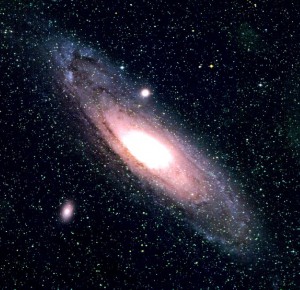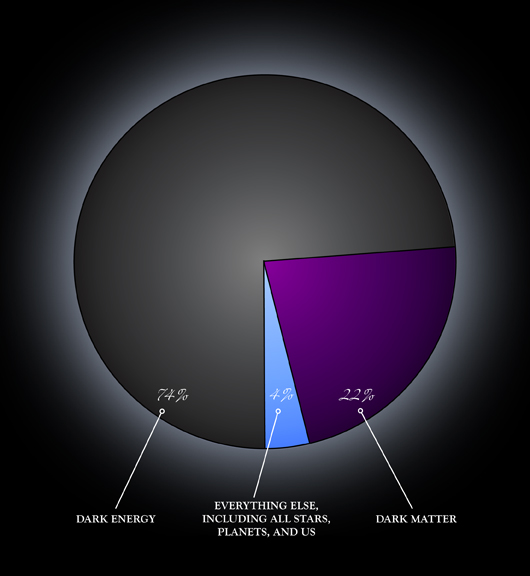Dark energy. Dark matter. Anti-matter. Que?
Yes, I know it looks like it’s some sort of puzzle, and the next in the series is anti-energy or some such thing. But nope, it’s not. And for anyone who’s familiar with these concepts (or adept at using Wiki), feel free to stop reading now.
The reason for this post is to explain the basic differences between these three phenomena. Why? Because I’m going to keep making mention of research that involves them, as will fellow Scibloggers including Marcus Wilson.
First, though, a brief discussion on what we mean by matter and energy.
Matter is a somewhat nebulous term (sorry, couldn’t help meself). It doesn’t have a strict definition, but is intuitively understood to mean the stuff that everything physical’s made from. Kittens. Stars. Underwear. Even iPads.
To be slightly more scientific, it’s generally understood to include everything that has mass and volume. Once you add in quantum mechanics, it gets more complicated - properties like mass and volume could be derived not only from the objects themselves, but also the way they interact with each other. And matter can, famously, exist as both waves and particles.
Confused? Excellent.
Next up, energy. Energy, in physics at least, is something which can be assigned to anything/any system of things, and is a result of the state of that thing/system. You get different kinds. Kinetic (moving). Potential (not moving, but could if it felt like it, as it were). Thermal (heat). Electromagnetic. Etc. The particularly fun thing about energy, of course, is that the first law of thermodynamics applies to it: you can neither create or destroy energy. You can only change its form. Which has some very, very interesting implications for all sorts of things from biological life to space elevators to the eventual fate of the universe and all contained within it. Of course, it’s also led to some unfortunately fluffy notions about what happens when we die…
In a super fun, if hardly recent, development, Einstein postulated that mass (which is something that matter has) can be defined as the measure of the energy content of that thing1. The not unfamous equation E = mc2 is how one writes this mathematically.
Anyhoo, now that we have a working (ish) understanding of matter and energy, let’s move on to the weirder stuff.
Anti-matter:
To understand this, one must understand that, in physics at least, most particles tend to have an oppositely charged counterpart: an antiparticle. For example, there are electrons (negatively charged) and antielectrons/positrons (positively charged). And the laws of physics tend to treat antiparticles much as they would particles - for example, an antielectron and and antiproton could form an antihydrogen atom. If this strange little beastie was then introduced to a ‘normal’ hydrogen atom, the result would be the annihilation of both and the production of fun things like gamma rays.
So, in the same way that matter is made up of particles, antimatter is basically collections of antiparticles. Why is most of the observable universe made of up matter rather than antimatter? We don’t have a sausage of a clue. It’s something over which, no doubt, many heavily-bearded boffins are tearing out their hirsute gloriousness.
Fun fact: antimatter is, apparently, the most costly substance in existence (as far as we humans know, at least), with an estimated cost of $25 billion per gram for positrons2.
Dark matter:
Less weird than dark energy, but still a little bit odd, dark matter was invented by physicists trying to understand why the universe wasn’t moving as it should. To define it, dark matter is simply matter which we can’t detect: it’s not electrically charged, and it doesn’t emit (or scatter) light or, for that matter, any other electromagnetic radiation. Indeed, it would seem that most of it isn’t made up of atoms at all (unlike the more prosaic normal matter).
So, if we can’t ‘see’ it, why do we think it’s there? Well, without its presence, the universe would be behaving very differently.
[Unless gravity works differently on large scales, but that’s the subject of another post. MONDians, calm yourselves3.]
Galaxies’ orbital velocities and rotational speeds would be different. We couldn’t explain some of the gravitational lensing4 we’ve seen. And so forth. Calculations done by people who’re really good at maths suggest that dark matter comprises some 22% of the mass-energy density5 of the observable universe. Matter makes up another 4 or so percent. The remainder brings us into the territory of the last, and weirdest, piece of the puzzle: dark energy.
Dark energy:
This is also a controversial subject. Not everyone’s convinced we have it right, but more on that shortly. Dark energy is, essentially, an hypothetical form of energy which, like the Force, permeates all space. Whether this is uniform - the cosmological constant Einstein so famously regretted inserting into general relativity - or not is under debate. The only of the fundamental forces through which it interacts is gravity6.
Why do we need it? Well, the universe appears to be accelerating outwards. Fast. Almost as if something were pushing it away from itself. That effect simply cannot be explained by what we observe.
Dark energy’s also needed to explain why the universe (which is pretty flat, apparently) is the shape that it is.
So why the controversy? Well, a large part of the problem is the amount of it. Every theoretical construct developed which includes it predicts far more of it than we have any evidence for. Hmmmmm.
Feel free to watch this video of Leonard Susskind explaining his thoughts on dark matter and dark energy:
[youtube]http://www.youtube.com/watch?v=3SiGujnfDVc[/youtube]
And there you have it. Some of the basics explained. I hope you retain them, as there might be a test, and there are certainly going to be posts making mention of them again…
A final note: I haven’t hyperlinked to obvious things such as definitions, since, frankly, everyone has Google. And I was bearing in mind my post on delinkification (yes, I see the irony there), this time trying to ensure that the cognitive overload placed on your brains by inline links was minimised only to those links which are interesting, and would not show up first on Google.
———————————-
1 I shall forbear from making bad jokes here about the fact that the more mass I seem to gain, the less energy I have, etc.
2 Does this sound like it could make for the most expensive, show-off gift around? Oh yeah! Show her love: give her positrons…
3 Or, to rephrase: pull yourselves towards yourselves. * snort * Again, apologies for that.
4 Um, gravitational lensing is what happens when the gravity of objects between us and distant galaxies warps the light we receive from those galaxies. Because yes, light can bend.
5 The E = mc2 thing again.
6 Interesting, as gravity is the loner of the other fundamental forces (the others are all linterlinked, but gravity stands apart, and is kind of part of the reason for the existence of the LHC and the epic search for the Higgs Boson).

